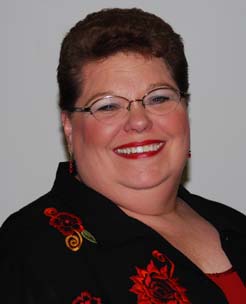In 1969, a few Central Michigan University (CMU) students saw that although other university towns had a 24-hour crisis line service, Mt. Pleasant did not. Three enterprising young people worked together to create a service that has added considerable value to the community. Their efforts have saved lives by redirecting folks from hurting themselves and others. By offering an empathic ear and helpful information, the Crisis Center has helped keep families together, made the area more welcoming and comforting for newcomers, and, provided people with information so they could help themselves.
 Kathleen Tarrant, the Crisis Center Director at Listening Ear, was among three individuals who founded Listening Ear in 1969. One summer while Kathleen’s three young children played at their feet, the founders responded to crisis calls coming into her home!
Kathleen Tarrant, the Crisis Center Director at Listening Ear, was among three individuals who founded Listening Ear in 1969. One summer while Kathleen’s three young children played at their feet, the founders responded to crisis calls coming into her home!
By the mid 1970’s, , the service operated from various donated spaces and on a very small budget. Despite this, the program grew to more than 370 calls a year and had nearly 50 volunteers.
During the 1980’s, as the number of calls increased to 2,000 a year, the Crisis Center expanded its information & referral services and produced a Resource Directory. The agency also began offering an after-hours call service for several local health and human service providers.

The growth in the number of calls has been remarkable. The number of calls nearly doubled from 1990 to 2000 and doubled again by 2007. Last year, 2010, the number of calls sky-rocketed to 26,956! We estimate approximately 28,000 calls will be answered during 2011, the current year.
The Crisis Center’s primary service is providing immediate information, referral, and crisis intervention to callers through its 24 hour hotline. The target area for the 24 hour hotline is primarily Clare and Isabella Counties. Listening Ear is also a 2-1-1 Call Center. During after-hours, 2-1-1 calls are answered by Listening Ear’s Crisis Center routed by the 2-1-1 Northeast Michigan Call Center (which includes Isabella, Clare, Midland, Gladwin, Gratiot, and eventually 17 additional northeastern Lower Peninsula counties of Michigan).
The type of calls during the last decade has also changed. During the early years, calls were most often university students and some community residents seeking a confidential and empathic listening ear while working through personal issues involving health, mental health and relationships. The last decade has seen a shift to calls from people from all walks of life struggling to meet day-to-day needs. For the last five years, the most common reason given for calling the Crisis Center was a person’s inability to meet their basic needs without help from local agencies.
The top priority needs continue to include:
- Housing: rent, security deposit, mortgage, emergency shelter.
- Utilities: electric, heat, deliverable fuels including wood, propane, pellets, corn; water.
- Transportation: gasoline, car insurance, registrations/tags, moving expenses, bus and transit passes, vehicle and bike repairs.
- Medical: prescriptions, glasses, emergency dental.
- Food: pantries, mobile pantries, Soup Kitchen.
We are hearing from community members who have never had to ask for help before, due to unemployment, cut-backs in hours of work, rising costs of goods and services.
Highly capable Crisis Center staff
The team of Crisis Center professionals manning the 24- hour service is made up of seven Mental Health Technicians/2-1-1 Call Specialists. Two have attained national certification (CIRS) through Alliance of Information and Referral Systems (AIRS). Each Mental Health Technician /2-1-1 Call Specialist has completed a stringent training course that includes 40 hours of study plus at least 20 hours of supervision.
Mental Health Technicians/2-1-1 Call Specialists provide supportive intervention for persons seeking information and referrals and for those with critical or emergency mental health issues, problems of victimization or abuse and other emergency situations. This program is unique in its ability to link callers with hundreds of community provider resources across multiple counties. The agency and the program are also accredited by the Council on Accreditation.
Now with nearly 40 years of experience in the human services field, Kathleen Tarrant, B.S., CIRS, Crisis Center Director says, “The types of calls we receive are more complex now. Lack of stability in jobs, housing, families and relationships seem more common. It is nearly impossible to get a job without a diploma and many jobs do not pay a living wage. Parents and grandparents may no longer live nearby to lend a hand. All of these contribute to stress.”
Mary, with a Bachelor’s degree and 17 years of experience, shares the story about how she once saved a man’s life. One night a distraught man called saying he was holding a gun. Mary was able to convince him to put the gun down. She then summoned the police to assist. She says, “I have no doubt that he would have killed himself had we not helped.”
On any given day, Listening Ear’s Crisis Center receives calls from community members dealing with a wide range of needs. Here are just a few examples:
- …a woman living in a truck with her 16 year old daughter; had left an abusive relationship, states the women’s shelters are full.
- …a man states he has “passing thoughts of suicide”; his young child was removed from his home and “…can’t stand the thoughts of not having him around…son’s birthday is next week.”
- …an elderly couple sleeping under a bridge in Mt. Pleasant.
- …a middle-aged woman stated she was recently raped, had tried to commit suicide in the past, and “…will try again.”
- …an employer trying to locate resources for an employee’s family who recently lost their young child to cancer.
- …50+ years old female talked almost an hour about feeling overwhelmed: parents are ill, husband is an alcoholic, her boss cut her hours at work. Caller said she “…sometimes wants to escape forever” and has random thoughts of suicide. (Caller indicated she felt better after talking and took referrals for mental health counseling.
Crisis Center staff listens to each caller, determines the actions required, and if requested, provides the caller with resources they can use to help themselves. Staff utilizes more than 400 resources to find help for callers. It is also a point of access for receiving help for a number of local helping agencies such as the Goodrow Fund and the Red Cross Food Pantry.
The Crisis Center also provides after-hours and week-end coverage for several agencies:
- The Crisis Center is a crucial part of the Isabella County’s Emergency Disaster Plan. During a disaster or following a critical incident (explosion, tornado, epidemic, war, etc.), the Crisis Center operates as the access point for emergency resource information such as sheltering, food, and other needs.
- The Crisis Response Team is made up of specially trained individuals from the community who respond after a critical incident/disaster involving multiple victims. The goal is to normalize behavior through critical incident stress management strategies. Formalized arrangements are in place with members of the Crisis Response Team in the following four counties: Clare, Isabella, Mecosta, and, Osceola.
- After hours emergency services are provided for Community Mental Health for Central Michigan including Isabella, Clare, Mecosta, Osceola, Gladwin, and Midland Counties, and The Montcalm Center for Behavioral Health for Montcalm County. Each of these counties call-forward their phone lines to the Agency’s designated mental health phone lines. Calls received and referrals made last year totaled 13,214.
- Salvation Army Homeless Shelter Program. This program provides shelter in a local motel for homeless people whose last known residence was in Isabella County. After-hours the Crisis Center Mental Health Technicians assist in screening people requesting shelter.
- Central Michigan Chapter of the American Red Cross. The Crisis Center provides after hours services for Red Cross programs in Isabella and Clare Counties. There were 190 referrals last year for the Red Cross Food Pantry and 6 persons were connected to the Red Cross on-call personnel for the Aid to Military Families and the Single Family Fire programs.
- The Goodrow Fund. The Goodrow Fund is a faith-based program established to help Isabella County residents with emergency needs not covered by other agencies or programs. Last year, 4,096 referrals were made.
- Heart for Health. A program of Sacred Heart Parish, Heart for Health provides assistance with paying for medical and prescription needs serving 361 referrals last year for Isabella County residents.
- Central Michigan University (CMU) Counseling Center. If there is an emergency situation involving a CMU student or employee, the Mental Health Technicians collect information and helps them connect with CMU counselors.
Not only does the Crisis Center provide information, referral, emergency response and after-hours services for other agencies, the program also supports all Listening Ear programs. After-hours and on-call services are coordinated for Listening Ear programs that serve consumers across 12 Michigan counties – from Grand Traverse County to the north to Ionia in the south. These programs include the agency’s Affordable Rentals program, Residential Services for persons with disabilities, and all Child and Family Services (Child Foster Care, Transitional Living, Runaway and Homeless Youth, and Child Sexual Abuse Treatment).



